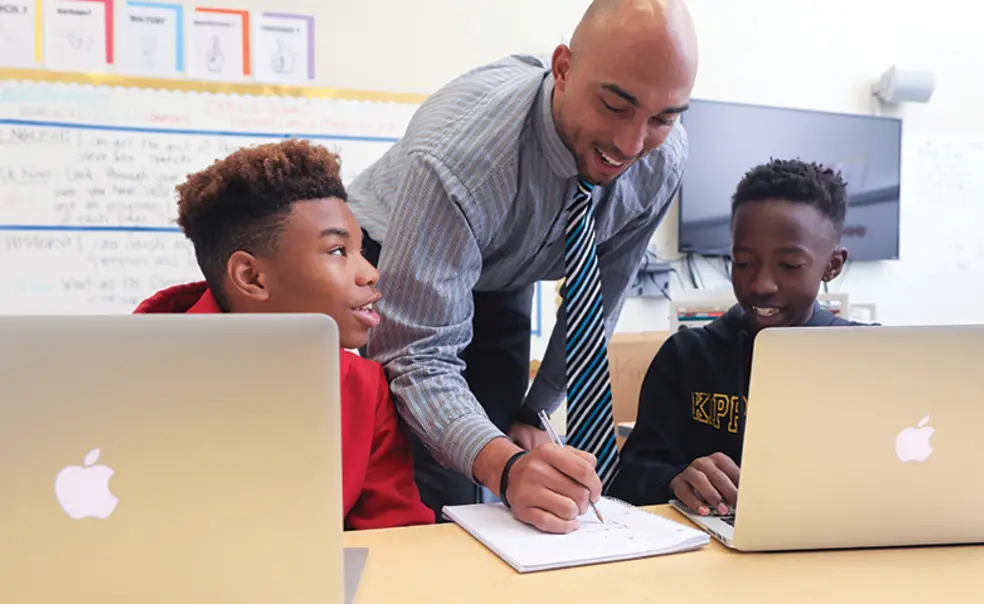Brandon Nicholson ’05 Is Mentoring Black Male Students in STEM
The harsh reality of inequity greeted Brandon Nicholson ’05 on his first day at a preparatory school in affluent Marin County, California.
Some of Nicholson’s high school classmates drove up in “absolutely brand new” cars. Unlike his earlier school days in his native Oakland, California, “there was no discussion about supplies or things we have to bring.”
“That ultimately solidified my interest in the space of equity and policy, just understanding that there are exponentially more resources available there,” Nicholson adds. “But no young person was more deserving of access to a quality education in Marin than anyone I encountered in Oakland. That really became the thrust for me to try and work on education policy.”
Nicholson is the CEO of The Hidden Genius Project, an Oakland-based organization that for more than a decade has trained and mentored upwards of 10,300 Black male students in technology creation, entrepreneurship, and leadership skills. Early success led to branches in the San Francisco Bay Area, Los Angeles, and Detroit.
Inc. magazine named the project to its best in business list for 2021. The magazine cited the project’s 15-month Intensive Immersion Program, which gives students in grades nine through 11 more than 800 hours of education and mentorship in computer science and business. Participants have a 90% post-secondary education matriculation rate.
“We can focus on specific needs and resources necessary to effect results with a particular population — Black boys and Black men in high school — but as we do that work, it has a benefit for all of us.”
— Brandon Nicholson ’05
CEO of The Hidden Genius Project
Nicholson says The Hidden Genius Project utilizes the concept of “targeted universalism,” espoused by equity expert John A. Powell. “It’s this whole idea that a rising tide lifts all boats,” says Nicholson, who earned his Ph.D. in educational policy from the University of California, Berkeley. “We can focus on specific needs and resources necessary to effect results with a particular population — Black boys and Black men in high school — but as we do that work, it has a benefit for all of us.”
The effectiveness of tech mentoring was underscored in a November 2021 survey of working-age Black Americans commissioned by Jobs for the Future, a nonprofit that works for equitable economic advancement. Among Black tech workers who had consulted mentors, 89% who had formal mentors and 78% who had informal mentors said the mentors were “extremely” or “very” useful in achieving their career goals. Only about 7% of Black Americans work in tech, which has led to a number of mentoring programs to attract more Black people to tech.
In September 2022, Google announced it was giving The Hidden Genius Project a $3 million grant, which expanded the program to Chicago and Atlanta. It’s a move toward the organization’s goal to reach 10 cities by 2025. Many youths entered the project with no formal computer science education but, “thanks to the technical and coding skills they learned through The Hidden Genius Project, they are now using technology to build their own businesses,” Google CEO Sundar Pichai wrote in a blog post.
“We have so much more we want to do in the communities where we currently are,” Nicholson says, “but we also want to collaborate and join arms with people doing the work in other communities where we see there is a great deal of potential, but not nearly as much access to opportunity to manifest that potential.”
Nominate Other Inspiring Alumni
This story is part of a new series highlighting the stories of alumni doing inspiring work. To nominate others, please email paw@princeton.edu.










1 Response
Richard D. Purcell ’83
2 Years AgoLet’s Collaborate for STEM
Thanks Brandon, for focusing your efforts on expanding educational opportunities for students in STEM. There are so many career opportunities, from technology to engineering to health care, that need an educated workforce for our future. Kids born into difficult socioeconomic circumstances should have a real shot at those opportunities. With the Hidden Genius Project, you can not only open new worlds of opportunity, but also prepare students with the rigorous academic foundation to succeed in rewarding careers. Good luck!